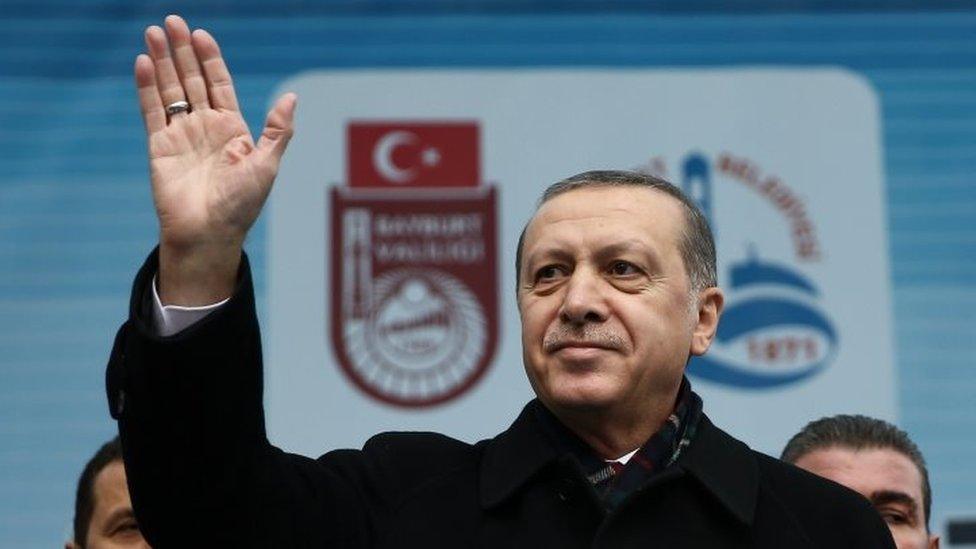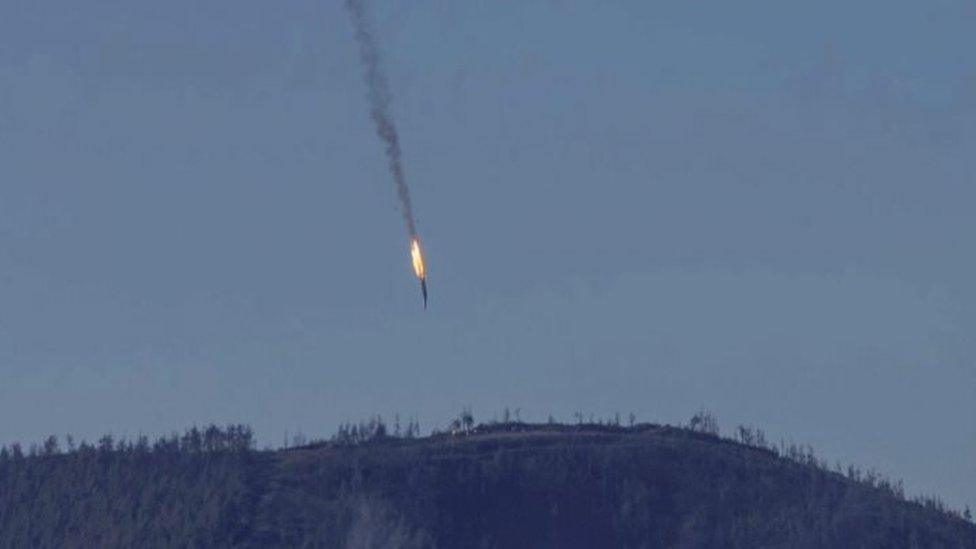Turkey challenges Russia over IS oil trade claim
- Published

President Erdogan has vowed to step down if Russia's claim about Turkey's trade with IS is proven
Turkey has challenged Russia to prove its claim that Ankara shot down a Russian plane in order to protect its oil trade with Islamic State (IS).
"If you allege something you should prove it," Turkish President Recep Tayyip Erdogan said.
He was responding to a statement by Russia's President Vladimir Putin. Russia says Turkey downed the jet as it was flying over Syria.
Turkey says the plane entered its airspace and was warned to leave.
One Russian pilot was killed and the other rescued after Russia's Su-24 bomber was shot down by a Turkish F-16 fighter on the Syrian border on 24 November.
A Russian marine was killed during the rescue operation in north-western Syria.
Russia has insisted the plane did not cross the border and that it gave advance notice of the flight path to the US, Turkey's ally.
But the US has supported Turkey's version of events. On Monday state department spokeswoman Elizabeth Trudeau said that "evidence from Turkey and our own sources indicates that Russian aircraft violated Turkish airspace",
She added that Russia had not informed the US or its coalition of its air operation. "We do not co-ordinate operations with the Russian Federation," she said.
'Emotional statements'
Vladimir Putin has said he believes the Russian jet was shot down "to protect oil supply routes to Turkey"
"You should put your documents on the table if you have any. Let's see the documents," Mr Erdogan said.
"We are acting with patience. It is not positive for the two countries which have reached a position which could be regarded as a strategic partnership to make emotional statements."
President Erdogan also vowed to step down if the allegation that Turkey was buying oil from IS proved true, suggesting that President Putin should do the same if he was wrong.
Russia is a major ally of Syrian President Bashar al-Assad and its air strikes have targeted rebel groups, including IS.
Turkey strongly opposes Mr Assad and has been accused of turning a blind eye to jihadist fighters crossing from its territory into Syria.

The Russian Su-24 bomber crashed into a mountainside after being hit by a missile from a Turkish F-16 fighter
Until a few months ago, Turkey was reluctant to play an active role in the coalition against IS. However, in August it allowed the US-led coalition to begin using its airbase at Incirlik.
Russia has imposed sanctions on Turkey over the downing of the plane, including restrictions on imports of Turkish food and an end to visa-free travel.
IS earns much of its money from illegal oil fields it controls in north-eastern Syria and western Iraq.
Some of the oil is sold to the Assad regime and some is smuggled through middlemen to Turkey. However, the Turkish government has consistently denied being involved in the trade.
'Terrorist haven'
"We have every reason to think that the decision to shoot down our plane was dictated by the desire to protect the oil supply lines to Turkish territory," Mr Putin said at a news conference in Paris on Monday.
Mr Putin also accused Turkey of harbouring "terrorist organisations" operating "in various regions of Russia, including the North Caucasus".
The Moscow government earlier said the Su-24 had been attacking "terrorists" from the North Caucasus based inside Syria when the Turkish jets attacked them.
Turkey and Russia have important economic links. Russia is Turkey's second-largest trading partner, while more than three million Russian tourists visited Turkey last year.
President Erdogan said Turkey would act "patiently, not emotionally" before deciding its response to the economic sanctions.
